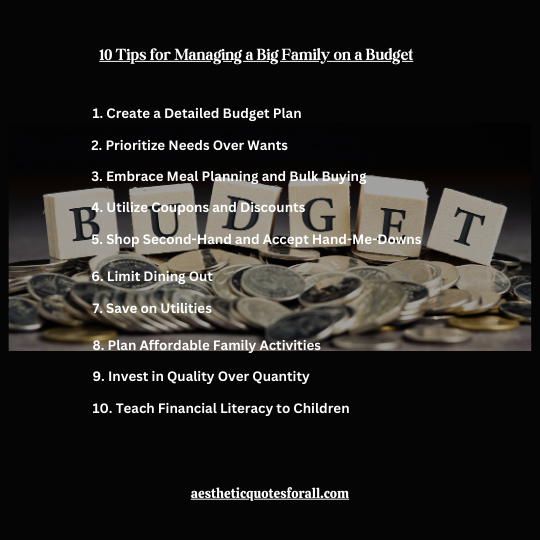10 Tips for Managing a Big Family on a Budget
Managing a big family can be both incredibly rewarding and challenging, especially when it comes to finances. With multiple mouths to feed, clothing needs, educational expenses, and various other costs, budgeting becomes crucial. Here are ten practical tips to help you manage a big family on a budget, ensuring your household runs smoothly without breaking the bank.
1. Create a Detailed Budget Plan
A comprehensive budget is the foundation of financial stability for any large family. Start by listing all sources of income and categorize your expenses into essentials like groceries, utilities, and housing, and discretionary spending like entertainment and dining out.
Steps to create a budget:
- Track Spending: Use a spreadsheet or a budgeting app to monitor daily expenses.
- Set Goals: Establish short-term and long-term financial goals, such as saving for a vacation or emergency fund.
- Review and Adjust: Regularly review your budget and make adjustments as needed to stay on track.
Benefits:
- Provides a clear picture of your financial situation.
- Helps identify unnecessary expenses.
- Ensures money is allocated to priorities.
2. Prioritize Needs Over Wants
Distinguishing between needs and wants is essential when managing a large family. Focus on spending for essentials and limit purchases of non-essential items.
Strategies:
- Needs: Groceries, utilities, clothing, and education.
- Wants: Dining out, luxury items, and entertainment subscriptions.
Benefits:
- Ensures financial resources are used efficiently.
- Helps instill financial discipline in children.
3. Embrace Meal Planning and Bulk Buying
Food expenses can be significant for big families. Meal planning and buying in bulk can lead to substantial savings.
Tips for meal planning:
- Weekly Menus: Plan meals for the week, including leftovers.
- Grocery List: Make a detailed shopping list to avoid impulse buys.
- Bulk Purchases: Buy non-perishable items and staples like rice, pasta, and canned goods in bulk.
Benefits:
- Reduces food waste.
- Saves time and money.
- Ensures balanced and nutritious meals.
4. Utilize Coupons and Discounts
Take advantage of coupons and discounts to save money on groceries and other household items. Many stores offer loyalty programs and digital coupons that can provide substantial savings.
How to maximize savings:
- Coupon Apps: Use apps like Honey, Rakuten, and Coupons.com.
- Store Loyalty Programs: Sign up for rewards programs at your favorite stores.
- Sales and Clearance: Shop during sales and clearance events for the best deals.
Benefits:
- Reduces overall grocery bill.
- Provides access to deals on necessary items.
- Makes shopping more strategic and cost-effective.
5. Shop Second-Hand and Accept Hand-Me-Downs
Clothing and furniture expenses can add up quickly. Shopping second-hand and accepting hand-me-downs from friends and family can be a game-changer.
Tips for shopping second-hand:
- Thrift Stores: Look for clothing, furniture, and household items at thrift stores.
- Online Marketplaces: Use platforms like eBay, Craigslist, and Facebook Marketplace.
- Community Swaps: Participate in community swap events for clothing and toys.
Benefits:
- Saves money on essential items.
- Promotes sustainability.
- Allows for more frequent wardrobe updates for growing children.
6. Limit Dining Out
Eating out is convenient but can be costly for a big family. Cooking at home not only saves money but also allows you to control the quality and nutrition of your meals.
Strategies to limit dining out:
- Meal Prep: Prepare meals in advance to avoid the temptation of takeout.
- Family Cooking Nights: Involve the family in cooking to make it a fun and educational activity.
- Budget for Treats: Allocate a specific amount for occasional dining out to avoid overspending.
Benefits:
- Reduces food expenses.
- Encourages healthy eating habits.
- Fosters family bonding through shared cooking experiences.
7. Save on Utilities

Utility bills can be a significant part of your monthly expenses. Implementing energy-saving practices can help lower these costs.
Energy-saving tips:
- LED Bulbs: Replace incandescent bulbs with energy-efficient LED bulbs.
- Smart Thermostat: Install a smart thermostat to optimize heating and cooling.
- Unplug Devices: Unplug electronics when not in use to prevent energy drain.
- Water Conservation: Fix leaks and use water-saving fixtures.
Benefits:
- Reduces monthly utility bills.
- Promotes environmental responsibility.
- Increases the lifespan of household appliances.
8. Plan Affordable Family Activities
Entertainment and leisure activities are important but can be expensive. Finding budget-friendly ways to spend time together can be both enjoyable and economical.
Affordable family activities:
- Parks and Nature Trails: Explore local parks and hiking trails.
- Game Nights: Host family game nights with board games or card games.
- Library Visits: Utilize the local library for free books, movies, and events.
- DIY Projects: Engage in DIY crafts or home improvement projects together.
Benefits:
- Strengthens family bonds.
- Encourages creativity and physical activity.
- Saves money on entertainment.
9. Invest in Quality Over Quantity
While it might seem counterintuitive, investing in high-quality items can save money in the long run. Durable products last longer and often come with better warranties and customer support.
Tips for investing in quality:
- Research: Read reviews and compare products before purchasing.
- Warranties: Choose items with good warranties and customer service.
- Cost-Per-Use: Calculate the cost-per-use to determine the value of an item.
Benefits:
- Reduces the need for frequent replacements.
- Ensures better performance and durability.
- Provides long-term savings.
10. Teach Financial Literacy to Children
Teaching children about money management is crucial for their future. Instilling good financial habits early can help them become responsible adults.
Ways to teach financial literacy:
- Allowance and Savings: Give children an allowance and encourage them to save a portion.
- Budgeting: Teach them to create and stick to a budget for their personal expenses.
- Financial Games: Use games and apps designed to teach financial concepts.
Benefits:
- Prepares children for financial independence.
- Encourages responsible spending and saving habits.
- Strengthens the family’s overall financial health.



